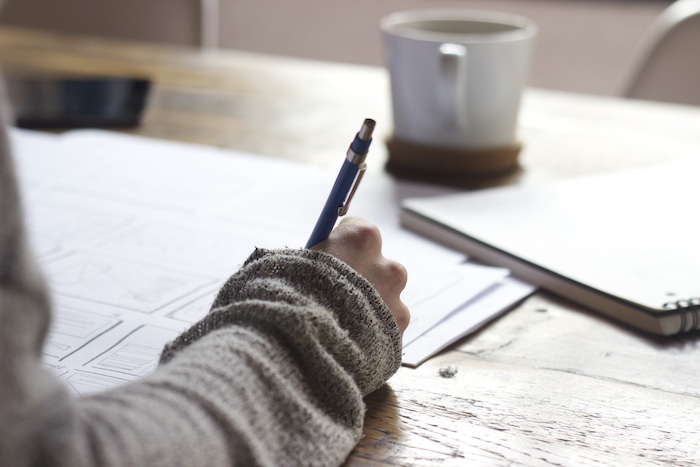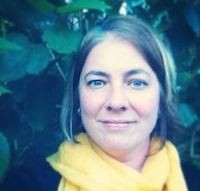I believe in the catharsis of journaling, I always have.
Even at a young age, before I even knew what catharsis was, I took a pen in hand to scribble about my day. I have stacks of journals, spanning decades of my life, and so I can definitely conclude I have always been a journaler—but recently, in my pursuit of greater mindfulness in my life, my old journaling habits were no longer serving me. They kept me stuck in examining the past or anxiety-ridden with long glances at the future. I needed to find a better way.
I used to write in the evenings, after the day was done and life was quiet and peaceful, and my time was beholden to no one. I wrote about my day, the events that marked it, and worries and troubles I wanted to let go of so I could rest unburdened.
But I had a sense this type of writing was too much of a backward glance. I was looking at the past, though only the recent past, and reliving it as if I could change it, which of course I couldn’t by that point.
Mindfulness isn’t about living in the past.
Then I began to write in the mornings, with a cuppa warming me from the inside out, and I would write about the day ahead—what I had to do that day, what I was anxious about, my goals and aspirations and dreams for that day. This was comforting, this morning writing ritual, and I loved it. But over time, it too began to feel futile. In this type of journaling, I was looking into the future and pulling my head and my heart into things that had yet to be.
Mindfulness isn’t about living in the future, either.
Mindfulness is a state of active and open attentiveness to the present, a beautiful existence of observing now and being awakened to the experience each moment offers as we step into it. Nightly journaling was a look at the past, morning journaling was a look into the future, and neither felt mindful or present to me.
I searched for a better way.
I closely examined my reasons for journaling. Though each person’s reasons are unique to them, for me journaling was about two things—recording my life, joys and struggles, and working through my anxieties on the page.
There is magic in journaling.
Cradling a pen and hovering over a page opens some channel in our heart, removing obstacles and putting us in touch with the Divine, whatever the Divine looks like in your experience. I didn’t want to miss this important part of my life’s experience by struggling to find a marriage between living in the present and journaling about past and future.
What I came up with is a hybrid of sorts, and I like to think I invented this technique, but do forgive me if there are several or millions of therapists, inspirational figures and healers who have already described this method of journaling and I simply am unaware of them.
I write in my journal in the mornings now, but I write in past-tense about the day ahead. I call it scripting, and it has revolutionized my ritual of preparing for the day ahead by gathering strength and purpose about me.
I’ll give you an example.
Instead of journaling about the fact that I have to go to the dentist today, and because I hate going to the dentist I am anxious about what will come, I write about this event in the morning as if it has already occurred.
I saw the dentist today, and I was calm and free of anxiety when I went. And everything turned out just fine—it wasn’t all good news, but I remembered to breathe through the experience, and do you know I actually had a wonderful visit? I was able to give a smile to a patient who was more anxious than I was, and I discovered that my hygienist and I have a lot in common. We really connected there in the dentist’s chair, as much as one can connect when their mouth is wide open and they are able only to grunt monosyllabic responses, that is. I had nothing to be fearful of.
Anxiety about the dentist thus scripted, I proceed to live my day exactly as I planned it.
Perhaps there is a conversation I have to have today which won’t be an easy one. Instead of allowing myself to worry about it, thus ruining my chances at being present and mindful in the hours leading up to that conversation, I script it, like this:
I talked with Rowan today, and I let her know she isn’t meeting my expectations in her job performance these past few months. She was resistant, as I knew she would be, but I pressed on and gave her objective evidence for my rationale in a clear and kind way. Then, I reached out and touched her arm, and looked in her eyes with compassion and said, “I am your boss, yes, but I also am a person with struggles, just like you. Won’t you share with me what’s going on in your life? I want to listen.” I listened with my heart and at the end of our conversation, we shared a hug; I understand where she’s coming from now, and she understands what I need as her employer. We forged a deeper connection today.
By scripting my day in advance, I demystify the unknown.
For me, the unknown—how I will react, what a situation will feel like, how someone will respond when I have to open a difficult conversation with them, and so on—is a source of anxiety which prevents me from being fully present for the moment when it arrives and fully present for the moments leading up to the situation I am dreading .
Of course, it is the wonder of each new day and the unknown of what is to come that keeps life interesting, but there are upcoming potholes we can see from short-range which we already know make us vulnerable and threaten to infringe on our ability to retain peace of mind and openness to the present moment. By scripting these potholes, I skate right over them. With these known threats to being present averted, I can proceed through my day with eyes wide open, heart full, and my being open to those beautiful, unforeseen wonders which make life a joy.
Scripting my day is a commitment to myself, an ink-on-page promise I make to handle anxiety-inducing situations with ease, looking for opportunities to approach each experience with the values I personally cherish—kindness, compassion, joy, happiness. Then, when those anxiety-inducing situations arise, I already know how I will handle them because I have already promised myself I will encounter that situation a certain way.
For those situations coming towards me which I couldn’t possibly foresee, I generally end my morning journaling with a catch-all declaration of my promise to myself. This promise is a variation of Reiki principles that resonate with me, but each of us has our own affirmations that can be subbed in. I write:
Today I lived with peace of mind. Today I was not angry and I attracted positivity and abundance. Today I walked in forgiveness and took no prisoners. Today I was grateful and performed my work with honesty and integrity. Today I respected all living things. Today, I was enough.
We cannot script our lives completely, and none of us would want to try. Where is the fun and adventure in that?
However, for the sake of being present for the sporadic unfolding of the precious moments of the day to come, I allow my journal to be written in the past tense, addressing things I know have a potential to rob me of peace. Once scripted, my promise to myself strengthens and empowers me for the day ahead, leaving me open and ready to receive the bounty of each new day.
I will always journal, but now my journaling ritual serves me in a way that keeps me open to the present moment.
Relephant Read:
Unexpected Self-Love SIde Effects of Journaling.
~
Author: Monica LaSarre
Image: Pexels







Read 0 comments and reply